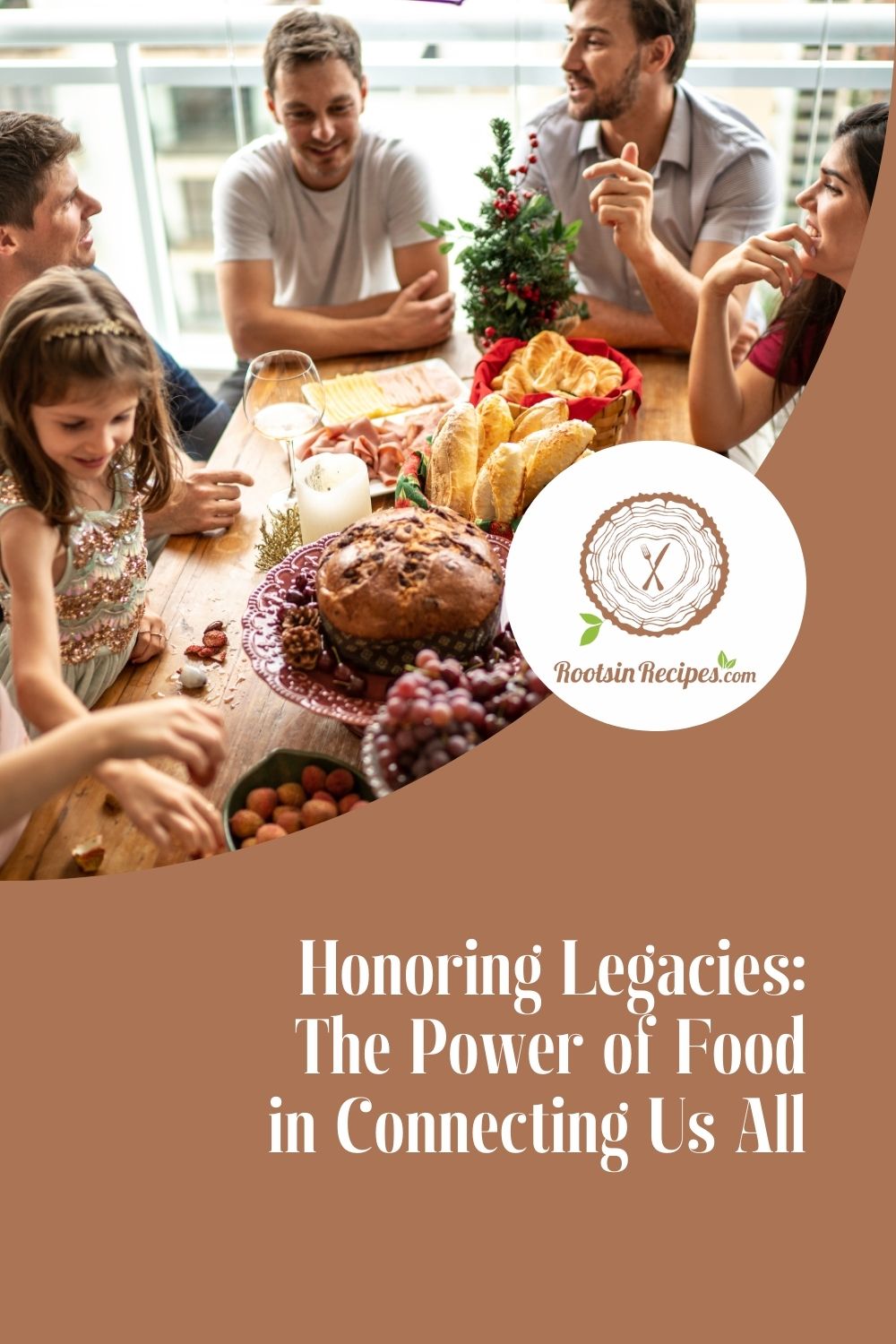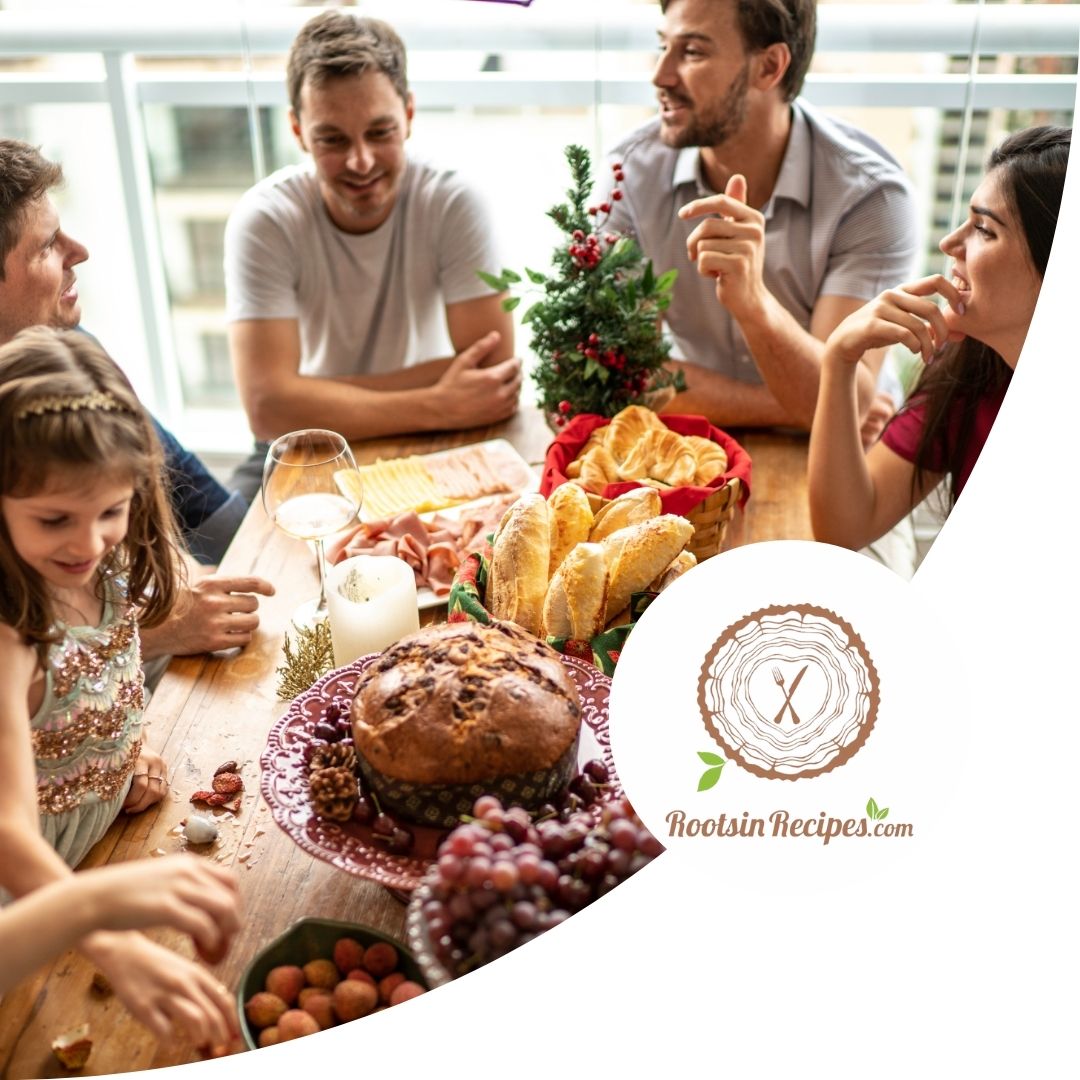
Introduction
On Martin Luther King Jr. Day, we commemorate a visionary whose life’s work sought to unify people of all backgrounds in the pursuit of equality and justice. Dr. King’s dream was of a world where diversity is celebrated, and barriers are replaced by bridges of understanding. It’s a vision deeply connected to the values we hold dear at RootsInRecipes.com: fostering connection, preserving legacies, and honoring the stories that make us who we are.
Food, like Dr. King’s message, has an unparalleled ability to bring people together. Around a shared table, differences fade as the universal language of taste and tradition takes center stage. In every bite of a family recipe, there’s a story—a legacy of love, resilience, and shared memory. Just as Dr. King inspired a sense of unity and belonging, so too does the act of cooking, sharing, and eating together.

Food as a Unifier
Dr. King’s efforts were rooted in the idea of togetherness. He often spoke of the “Beloved Community,” a society in which all people can share in the wealth of the earth, free from hatred, violence, and discrimination. In many ways, food represents a tangible manifestation of that vision. When we gather to share a meal, we create an opportunity for connection, breaking down walls and building understanding. Food invites conversation, fosters empathy, and provides a space where stories can be shared.
Consider the many cuisines that have traveled across borders, becoming beloved staples in cultures far from their origins. The soul food that nourished communities during the Civil Rights Movement, for instance, has roots in African traditions, blended with the experiences of enslaved people and adapted over centuries. These dishes—collard greens, cornbread, black-eyed peas—tell a story of survival, resistance, and joy in the face of adversity. They also remind us of our shared human experience: the need for nourishment, the comfort of tradition, and the joy of gathering.
My Family’s Story
In my own life, food has been a powerful connector, linking me to my ancestors and preserving their stories. My grandmother, Phyllis Emma Jean King, was a chemist during World War II and a vibrant force in our family. Known affectionately as the “chemist in the kitchen,” she approached cooking with both precision and passion. Her recipes were more than just meals; they were expressions of her personality and her history. Whether she was preparing her signature pies or experimenting with new flavors, she infused every dish with love and creativity.
Through her recipes, I’ve come to know not just her story but the broader story of our family. Her dishes have become a way for me to share her legacy with my children, nieces, and nephews. Each time I cook one of her recipes, I feel connected to her and to the generations who came before us. It’s a reminder that we are part of something bigger than ourselves—a family, a history, a community.
Preserving Stories Through Food
One of the greatest gifts we can give future generations is the preservation of our stories. Just as Dr. King’s speeches, writings, and actions have been carefully recorded and passed down, so too can we document and share the narratives embedded in our family recipes. These recipes are often more than the sum of their ingredients; they are symbols of culture, identity, and memory.
At RootsInRecipes.com, we encourage families to create their own cookbooks—not just as a collection of dishes but as a repository of stories. Each recipe becomes a chapter, each meal a page in the book of your family’s legacy. This act of preservation is not just about saving recipes; it’s about honoring the people and experiences that shaped them.
How to Use RootsInRecipes to Create Your Cookbook
Creating a family cookbook with RootsInRecipes.com is an accessible and rewarding process. It starts with signing up for an account, which gives you access to tools designed to make capturing your family’s culinary history easy and fun. Once you’ve signed up, you can:
- Upload Recipes and Stories: Begin by gathering your cherished family recipes, along with the stories, memories, and photos that make them special. Whether it’s a handwritten card from your grandmother or a dish you perfected last year, every entry adds richness to your cookbook.
- Organize Your Recipes: Use our platform to categorize your recipes by course, occasion, or family member. This makes it simple to navigate your cookbook and ensures that every contribution has its place.
- Add Visual Elements: Upload photos of the finished dishes, old family gatherings, or even the people who inspired the recipes. These visuals bring your cookbook to life and create a keepsake that future generations will treasure.
- Personalize It: Add personalized dedications and family anecdotes to give it a special touch.
- Download or Order Printed Copies: Once your cookbook is complete, you can download it as a PDF to share digitally or order professionally printed copies. Our high-quality printing options ensure that your family cookbook becomes a cherished heirloom.
By following these steps, you’re not just creating a book—you’re crafting a legacy. Each recipe and story you include helps preserve the values, traditions, and love that define your family.
Food as Activism
During the Civil Rights Movement, food played a vital role not just as sustenance but as a form of activism. The sit-ins at lunch counters across the South were powerful acts of resistance, challenging segregation and asserting the right to dignity and equality. These events highlighted the symbolic power of food and the spaces where it is shared.
Moreover, the communal meals that sustained activists during marches and rallies were acts of solidarity. Cooking and sharing food became a way to strengthen bonds, sustain energy, and affirm the humanity of a movement that sought to dismantle systems of oppression. Today, as we reflect on Dr. King’s legacy, we can draw inspiration from this history, recognizing the role that food continues to play in movements for justice and equity.
Building Bridges Across Cultures
One of the most beautiful aspects of food is its ability to transcend cultural boundaries. A single dish can carry the flavors and traditions of a region while also being adapted and embraced by people far away. This exchange of culinary traditions fosters mutual respect and appreciation, creating connections between people who might otherwise never meet.
In our increasingly globalized world, the sharing of food has become a way to celebrate diversity. Potlucks, food festivals, and international markets are spaces where people come together, bringing their unique flavors and stories to the table. These gatherings remind us of our common humanity and the richness of our differences.
Honoring Dr. King’s Vision Through Food
This Martin Luther King Jr. Day, let’s honor Dr. King’s vision by embracing the power of food to connect us all. Whether it’s preparing a meal from a family recipe, sharing a dish with neighbors, or exploring the cuisines of another culture, we can use food as a tool for building understanding and fostering community.
Consider hosting a dinner inspired by the principles of Dr. King’s Beloved Community. Invite friends and family to bring dishes that reflect their heritage, and use the meal as an opportunity to share stories and discuss the values of equality, justice, and togetherness. In doing so, you’ll be celebrating not only the legacy of Dr. King but also the enduring power of food to bring people together.
Creating Your Own Legacy
At RootsInRecipes.com, we believe that everyone has a story worth sharing. By creating a family cookbook, you can preserve the recipes and memories that define your heritage. It’s a way to honor the past, celebrate the present, and inspire the future.
Your cookbook is more than just a collection of dishes; it’s a testament to the resilience, creativity, and love that have been passed down through generations. It’s a reminder that we are all connected, not just by blood but by the stories we share and the food we prepare.
Conclusion
This Martin Luther King Jr. Day, as we reflect on the life and legacy of a man who dreamed of unity and justice, let’s also reflect on the ways we can embody those ideals in our daily lives. Through food, we can honor our own legacies and build connections with others. We can create spaces of belonging, celebrate diversity, and share the stories that make us who we are.
Dr. King once said, “Everybody can be great … because anybody can serve.” In the kitchen, we find a powerful way to serve—to nourish, to connect, and to inspire. So, this year, let’s cook, share, and honor the legacies that bind us together. Let’s make our tables places of unity, love, and understanding—places where Dr. King’s dream continues to thrive.